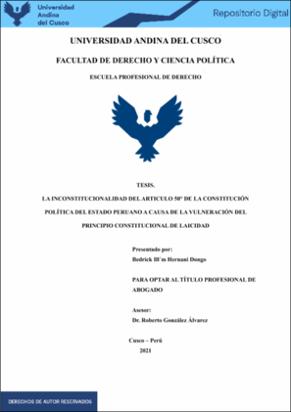| dc.contributor.advisor | González Álvarez, Roberto | |
| dc.contributor.author | Hernani Dongo, Bedrick Ill´m | |
| dc.date.accessioned | 2022-04-11T17:09:09Z | |
| dc.date.available | 2022-04-11T17:09:09Z | |
| dc.date.issued | 2022-03-02 | |
| dc.identifier.uri | https://hdl.handle.net/20.500.12557/4522 | |
| dc.description.abstract | El Estado peruano es un Estado Constitucional de Derecho, por lo que nuestra Constitución
Política es la carta fundamental, en la cual se establecen cuáles son los principios básicos para
el funcionamiento estatal; siendo uno de ellos el principio constitucional de laicidad, el cual se
encuentra reconocido en nuestra Constitución Política de manera implícita, teniendo un
reconocimiento jurisprudencial, ya que el Tribunal Constitucional menciona que el
reconocimiento del principio de laicidad se encuentra en el artículo 50 de la Constitución
Política, ya que se menciona el régimen de “independencia y autonomía”; pero, en el mismo
artículo se reconoce de manera explícita a la iglesia católica por su labor realizada y como
consecuencia de ello colabora con la misma de manera obligatoria, mientras que la
colaboración con el resto de confesiones se ve totalmente condicionada.
Dicha colaboración con la iglesia católica se conoce como el Concordato, el mismo que fue
firmado en el año 1980, y fue aprobado mediante Decreto Legislativo N° 23211, siendo que
mediante el Concordato se otorgaban diversos beneficios a la iglesia católica, como es el
régimen económico diferenciado, ya que se le otorgan diversos beneficios tributarios a la
iglesia católica al igual que se otorga un beneficio económico a la misma, realizando pagos al
personal eclesiástico; y se tiene la enseñanza religiosa, ya que se tiene al curso de religión como
un cursos ordinario, enseñándose dentro del mismo todo lo referido a la religión católica, lo
cual es inconstitucional ya que vulnera los derechos fundamentales de igualdad y de libertad
religiosa, los mismos que se conforman como un elemento fundamental del principio
constitucional de laicidad.
En tal sentido, y estando a la búsqueda de la seguridad jurídica y un pleno respeto de la
Constitución Política, la presente tesis pretende demostrar la inconstitucionalidad del artículo
50 de la Constitución Política, y, por ende, del Concordato firmado en 1980. | es_PE |
| dc.description.abstract | The Peruvian State is a Constitutional State of Law, so our Political Constitution is the
fundamental law, which establishes the basic principles for the functioning of the State; being
one of them the constitutional principle of laicity, which is recognized in our Political
Constitution in an implicit way, having a jurisprudential recognition, because the
Constitutional Court mentions that the recognition of the principle of laicity is found in the
article 50 of the Political Constitution, since it mentions the regime of “independence and
autonomy“; However, in the same article, the Catholic faith is explicitly recognized for its work
and, as a consequence, it collaborates with it in an obligatory manner, while the collaboration
with the rest of the confessions is totally conditioned.
This collaboration with the Catholic faith is known as the Concordat, which was signed in 1980
and was approved by Legislative Decree No. 23211. The Concordat granted several benefits to
the Catholic faith, such as the differentiated economic regime, since several tax benefits are
granted to the Catholic faith as well as an economic benefit to the same, making payments to
the ecclesiastical personal; and there is religious education, because the religion course is
considered an ordinary course, teaching within it everything related to the Catholic religion,
which is unconstitutional because it violates the fundamental rights of equality and religious
freedom, which are a fundamental element of the constitutional principle of laicity.
In this sense, and in the search for legal certainty and full respect for the Political Constitution,
the present thesis intends to demonstrate the unconstitutionality of Article 50 of the Political
Constitution, and, therefore, of the Concordat signed in 1980. | en_US |
| dc.format | application/pdf | es_PE |
| dc.language.iso | spa | es_PE |
| dc.publisher | Universidad Andina del Cusco | es_PE |
| dc.rights | info:eu-repo/semantics/openAccess | es_PE |
| dc.rights.uri | https://creativecommons.org/licenses/by-nc-nd/4.0/ | es_PE |
| dc.subject | Principios constitucionales | es_PE |
| dc.subject | Concordato | es_PE |
| dc.subject | Constitucionalidad | es_PE |
| dc.subject | Condición de laico | es_PE |
| dc.title | La inconstitucionalidad del artículo 50° de la constitución política del estado peruano a causa de la vulneración del principio constitucional de Laicidad | es_PE |
| dc.type | info:eu-repo/semantics/bachelorThesis | es_PE |
| thesis.degree.name | Abogado | es_PE |
| thesis.degree.grantor | Universidad Andina del Cusco. Facultad de Derecho y Ciencia Política | es_PE |
| thesis.degree.discipline | Derecho | es_PE |
| dc.publisher.country | PE | es_PE |
| dc.subject.ocde | https://purl.org/pe-repo/ocde/ford#5.05.01 | es_PE |
| renati.advisor.dni | 23864455 | |
| renati.advisor.orcid | https://orcid.org/0000-0001-9782-6228 | es_PE |
| renati.author.dni | 72213454 | |
| renati.discipline | 421016 | es_PE |
| renati.juror | Díaz Torres, José Hildebrando | |
| renati.juror | Delgado Otazú, Ericson | |
| renati.juror | Delgado Montaño, Mario Miguel | |
| renati.juror | Mercado Espejo, Ivonne | |
| renati.level | https://purl.org/pe-repo/renati/level#tituloProfesional | es_PE |
| renati.type | https://purl.org/pe-repo/renati/type#tesis | es_PE |


